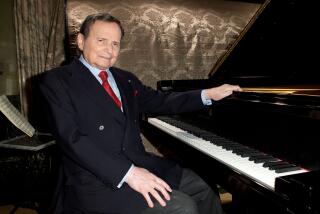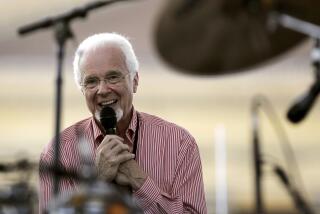Opera Singer George London Dies
- Share via
George London, whose brilliant operatic career was cut short by two physical tragedies, died Sunday night in Armonk, N.Y.
The bass-baritone, the first American to sing “Boris Godunov” at the Bolshoi Opera in Moscow, was 64 and had been unable to speak, stand or write since a heart attack left him unconscious and brain-damaged in 1977.
That misfortune followed by 10 years the loss of his singing voice when it was discovered that a nerve attached to one of his vocal cords had atrophied.
London the singer started to become London the impresario and was hoping to launch opera companies in Los Angeles and Washington when he suffered the heart attack. Too much time evidently lapsed before he was treated, and his brain was permanently damaged.
Since then he had been confined to his home, where his wife, Nora, and two children oversaw round-the-clock nursing care. A Kennedy Center gala staged in 1981 helped defray the cost of that care.
His death marked the end of one of the most promising musical careers in American operatic history.
He was born George Burnstein in Montreal and moved to Los Angeles at an early age. He graduated from Hollywood High School and studied opera with Hugo Strelitzer at Los Angeles City College, where he returned in 1961 to tell music students, “My preparation (at City College) set the groundwork for my entire career.”
By the 1940s he was touring with an odd ensemble called the Bel-Canto Trio. The trio’s soprano became a famous prima donna--Frances Yeend--and the tenor became a world-famous film star who also died prematurely--Mario Lanza.
Soon his repertoire included Wotan in Wagner’s “Ring Cycle” operas and all four villains in Offenbach’s “The Tales of Hoffmann.” He also created the title role in Gian Carlo Menotti’s satirical “The Last Savage.”
He had made his full-scale opera debut in 1946 with the San Francisco Opera in the title role of Verdi’s “Rigoletto” and sang the world premiere of Hindemith’s “When Lilacs Last in the Dooryard Bloomed” that year. He debuted in Europe in 1949 with the Vienna Opera as Amonasro in Verdi’s “Aida.”
London’s Metropolitan debut came two years later, when he sang Amonasro on opening night.
His first appearance at La Scala was in 1951 as Pizarro in Beethoven’s “Fidelio.”
The 6-foot, 2-inch, 200-pound London returned often to Los Angeles, where he had his professional start in two unnoticed supporting roles at the Hollywood Bowl in 1941. He concertized at Pasadena Civic Auditorium and the old Philharmonic Auditorium, where he had been an usher while studying at Los Angeles City College. He sang the title role in “Don Giovanni” at Shrine Auditorium and offered a 1964 recital at Hollywood High.
When the Met revived “Boris” in a 1953 English translation, the 31-year-old London was accorded 11 curtain calls.
His other firsts included becoming the first American Kammersaenger (court singer) in Austria and the first American Fliegende Hollander (“Flying Dutchman”) in Bayreuth, Bavaria, home of the Wagner repertoire he had mastered.
Definitive Rendering
He leaves a proliferation of recordings, including Mandryka in Richard Strauss’ “Arabella” (a role he created for its U.S. premiere in 1955), of Amfortas in “Parsifal,” of Boris with the Bolshoi and of Scarpia in “La Tosca,” a recording he made with Renata Tebaldi that to many remains the definitive rendering of that Puccini work.
Music critic Martin Bernheimer, on the eve of the Kennedy gala that was designed to offset more than $200,000 in London’s medical bills, remembered him as “a model of the enlightened, versatile, American singing actor.”
More to Read
The biggest entertainment stories
Get our big stories about Hollywood, film, television, music, arts, culture and more right in your inbox as soon as they publish.
You may occasionally receive promotional content from the Los Angeles Times.










